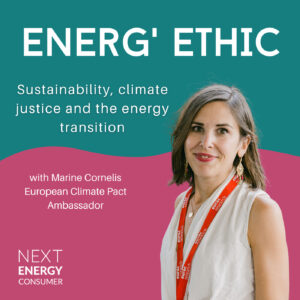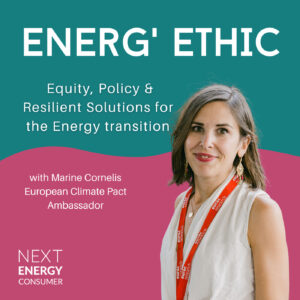Last week, I joined two important conversations about the energy transition led by the European Commission’s DG Energy: the Citizens’ Energy Forum and the 3rd Regulatory Roundtable on Energy Policy for Consumers. Both were packed with high-level debates, passionate interventions, and—let’s face it—a few policy clichés. But the real question that emerged for me wasn’t about the complexity of regulatory frameworks or how to incentivize demand response. It was much simpler: are we building systems that work for actual people?
I don’t mean hypothetical “engaged citizens” who eagerly track kilowatt hours. I mean the families worried about next month’s electricity bill, or the tenants whose landlords won’t invest in insulation because it’s “too much hassle.” The events left me reflecting on how much further we have to go—and how much we’re at risk of overcomplicating what should be basic.
The Good: Moments That Felt Like Progress
Let me start with the positive, because some genuinely thoughtful ideas cut through the noise.
- Tiered pricing that makes sense for people’s lives
One Hungarian regulator shared how a tiered system helped curb gas use during a crisis: basic consumption stayed affordable, while excessive use was charged at higher rates. It wasn’t perfect, but it struck a balance. People didn’t feel punished for heating their homes, but they had clear incentives to cut back where possible. “Accurate metering and demand-side flexibility are critical,” they said. And for once, the theory actually seemed to line up with what people need in practice. - Energy communities for the many, not the few
Energy communities came up again and again, but one insight stood out: we need to embed these efforts in existing structures—cooperatives, local housing initiatives, even schools. One speaker reminded us that the barriers are often psychological: “Why would I set up an energy community if a commercial provider is already doing energy sharing for me?” If we want people to join, the process has to feel relevant and doable, not like applying for a second job. - Clarity over perfection
A session on empowering consumers emphasized the need for better communication, especially around energy pricing. One participant shared their personal frustration with switching providers: “I could’ve saved money, but the process was so annoying I stayed put.” It was a reminder that simplicity isn’t a luxury—it’s the key to trust.
The Bad: What’s Still Holding Us Back
For all the progress, I couldn’t shake the feeling that the system still prioritizes complexity over care.
- Affordability as an afterthought
One of the most striking moments came during a discussion about renovation costs. A participant mentioned that for their father-in-law, retrofitting his home would cost the equivalent of eight years of income. Eight years. If that doesn’t illustrate the gap between policy ambition and reality, I don’t know what does. We keep hearing that the energy transition is an “investment,” but for whom? - The digital divide no one wants to talk about
Over 30% of Europeans lack basic digital access, whether it’s to smart meters, apps, or even reliable internet. These are not “edge cases.” They’re entire demographics being sidelined. One speaker called it bluntly: “Flexibility and participation depend on access—but what happens when you don’t even have the tools?” - Gas phase-outs without clear alternatives
In Greece, where gas subsidies help vulnerable households, the proposed phase-out plans are hitting resistance—not because people are clinging to gas, but because the alternatives are unclear and often unaffordable. It’s hard to buy into a transition that feels like a downgrade.
The Ugly: What We’re Overcomplicating
Energy policy often seems trapped in a love affair with its own complexity. Smart meters are touted as a game-changer, but they’re meaningless without automation that makes them user-friendly. Energy communities are promoted as the future, but most people can’t even understand their electricity bills, let alone a cooperative’s bylaws. And while there’s endless talk about “dynamic pricing,” what many households really want is a predictable, fair bill that doesn’t require them to become amateur energy traders.
One participant nailed it when they said, “People don’t care about innovation; they care about what works.”
We need to stop designing systems for the idealized consumer who has time to research tariffs and join a pilot project. Most people are busy, distracted, or just tired. Solutions have to fit into their lives, not the other way around.
So, Where Do We Go From Here?
Here’s what I took away:
- Simplify the messaging, but keep the substance
People need clear, honest communication about how policies will affect them. Not marketing campaigns about “empowerment.” - Design for actual people, not policy prototypes
If it takes three hours to understand an energy offer, it’s not a solution. Test new systems with real users—families, tenants, retirees—before rolling them out. - Stop making affordability a second-tier priority
If the transition doesn’t deliver tangible benefits to middle- and low-income households, we will lose the public’s trust. No amount of “stakeholder engagement” can fix that.
A Final Thought
There’s so much potential to make the energy transition meaningful for everyone. But I’m worried by how far the system is from meeting people where they are. The energy transition is often described as a once-in-a-generation opportunity. But for it to succeed, it can’t feel like a privilege. It has to feel like a right.
So, I’ll leave you with this: what would it take for someone like your neighbor—or maybe even you—to say, “This actually makes my life better”?
Let’s make that the measure of success.
What do you think? Share your thoughts below—I’d love to hear them.



